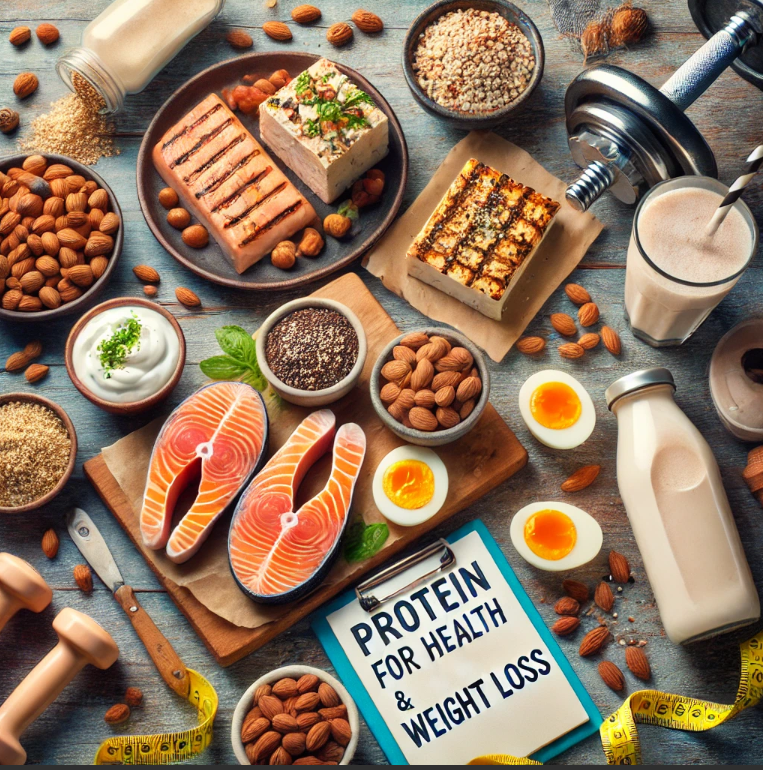Protein is a crucial nutrient that plays a vital role in almost every process of the human body. From building muscle to maintaining a healthy immune system, the importance of protein in the body cannot be overstated. This blog explores the top 12 benefits of protein, supported by data, insights, and frequently asked questions to help you understand why protein deserves a central place in your diet.
1. Muscle Building and Repair
Protein is the cornerstone of muscle building and repair. It provides the essential amino acids required for muscle tissue recovery after physical activities. This is why athletes and fitness enthusiasts prioritize high protein foods in their diets.
2. Supports Weight Loss
If you’ve ever wondered, “why is protein important for weight loss?”, the answer lies in its ability to boost metabolism and promote satiety. High protein foods keep you full longer, reducing unnecessary calorie intake and aiding in fat loss.
3. Improved Bone Health
Contrary to the myth that protein harms bones, studies show that adequate protein intake is essential for maintaining bone density, especially in older adults.
4. Enhanced Immune Function
Proteins form antibodies that help fight infections, making them integral to a robust immune system. Including protein-rich foods in your diet can strengthen your body’s defense mechanisms.
5. Better Hair, Skin, and Nails
Protein is a structural component of keratin, which forms your hair, skin, and nails. Protein deficiencies can lead to brittle nails, hair loss, and dull skin.
6. Hormone Regulation
Protein aids in the production and regulation of hormones that control various bodily functions. This is especially important when considering “what does protein do for a woman’s body,” as hormonal balance impacts menstrual health, pregnancy, and more.
7. Appetite Control
Including protein in your meals can help control hunger and reduce cravings. It’s a key strategy for those wondering “how eating more protein changed my body” when trying to adopt a healthier lifestyle.
8. Boosted Metabolism
Digesting protein burns more calories compared to fats or carbohydrates, leading to an increased metabolic rate. This process, known as the thermic effect of food (TEF), underscores protein’s importance for weight management.
9. Enhanced Recovery After Injury
Protein is vital for tissue repair and healing. It accelerates recovery from injuries by aiding cell regeneration and repair.
10. Energy Source
Although carbohydrates are the body’s primary energy source, protein can serve as a backup during prolonged fasting or strenuous exercise.
11. Supports Growth and Development
Children and adolescents require protein for proper growth and development. Protein-rich foods ensure adequate nutrient intake for building tissues and organs.
12. Maintains Muscle Mass with Age
As we age, muscle mass naturally declines. Consuming protein-rich diets can help counteract muscle loss, ensuring better mobility and strength in older years.
Table: Protein Content in Common Foods
| Food Item | Protein Content (per 100g) | Calories |
|---|---|---|
| Chicken Breast | 31g | 165 |
| Eggs | 13g | 155 |
| Lentils | 9g | 116 |
| Greek Yogurt | 10g | 59 |
| Tofu | 8g | 76 |
| Almonds | 21g | 579 |
| Salmon | 25g | 208 |
| Protein Powder* | Varies | Varies |
*Protein powder values depend on the brand and type.

Common Questions About Protein
1. What are the protein advantages and disadvantages?
Advantages: Muscle building, weight management, and improved immunity. Disadvantages: Overconsumption can strain the kidneys and lead to dehydration or nutrient imbalances.
2. What are the top 10 protein foods?
- Chicken breast
- Eggs
- Lentils
- Greek yogurt
- Tofu
- Almonds
- Salmon
- Cottage cheese
- Tuna
- Protein powder
3. Why is protein important for weight loss?
Protein promotes satiety, boosts metabolism, and reduces cravings, making it easier to maintain a calorie deficit.
4. How does protein powder help?
Protein powder is a convenient way to meet daily protein needs, especially for those with busy lifestyles or higher protein requirements.
5. What does protein do for a woman’s body?
Protein supports hormonal balance, muscle maintenance, and overall health, including pregnancy and post-menopause needs.

